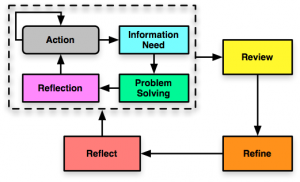Again as preparation for our upcoming presentation (you can attend!), I was thinking about the skills necessary to cope in this new information age. That includes not only the performance skills but also meta-learning, and I decided it was also time to take another stab at capturing the concept as a graphical representation.
 Here, I start with the hermeneutic notion of how we act in the world and learn. We start with things well-practiced, but if we have a problem, a breakdown, we look for an answer. Here we contact people to find an answer, or search for information. There are a suite of associated skills: information lookup, answer validation, filtering, etc.
Here, I start with the hermeneutic notion of how we act in the world and learn. We start with things well-practiced, but if we have a problem, a breakdown, we look for an answer. Here we contact people to find an answer, or search for information. There are a suite of associated skills: information lookup, answer validation, filtering, etc.
If we can’t find the answer, we have to go into active problem-solving. Here we might also need people, but note that they’re different folks; there is no one with the answer (or we’d have found them before) and instead they might be collaborators, process facilitators, analysts, etc. We might need data to look for patterns, or models to help us solve the problem. Again, there are a suite of related skills: leadership, representation and modeling, systematicity, sampling, etc.
If and when we find the answer, we should update the resources for other folks to not have to solve the problem separately. Here we have additional skills: communication, change management, etc.
Then we get into meta-learning. Here we are interested in how do we evaluate our own performance, look at what we’re doing and how we can get better at it, and support ourselves through the change. This is an additional source of skills like self-reflection, working with mentors, etc.
All told, these are the processes that the knowledge or concept worker requires, going forward. And, of course, capturing the associated skills. So, in light of my last post on social learning, what do you think about this? Does it make sense to you?
The external Review-Refine-Reflect loop seems to be lacking in many workplace training & development structures. First of all, there are often restrictions on what information you can review, often limited to whatever is allowed on the intranet, like Books 24/7. In many workplaces, there is little time for reflection. Too often, action trumps reflection.
The activities inside the dotted line seem to reflect the constrained space of much workplace learning. Meta learning (outside the box) is the opportunity to develop deeper thinking and learning skills. This is a good diagram to show the value of informal, networked social learning.
I agree with Harold. Active reflection is so very often lacking in the flowchart of learning and performance.